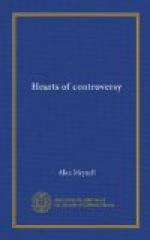He is urgent with his booty of words, for he has no other treasure. Into his pocket he thrusts a hand groping for hatred, and draws forth “blood” or “Hell”—generally “Hell,” for I have counted many “Hells” in a quite short poem. In search of wrath he takes hold of “fire”; anxious for wildness he takes “foam,” for sweetness he brings out “flower,” much linked, so that “flower-soft” has almost become his, and not Shakespeare’s. For in that compound he labours to exaggerate Shakespeare, and by his insistence and iteration goes about to spoil for us the “flower-soft hands” of Cleopatra’s rudder-maiden; but he shall not spoil Shakespeare’s phrase for us. And behold, in all this fundamental fumbling Swinburne’s critics saw only a “mannerism,” if they saw even thus much offence.
One of the chief pocket-words was “Liberty.” O Liberty! what verse is committed in thy name! Or, to cite Madame Roland more accurately, O Liberty, how have they “run” thee!
Who, it has been well asked by a citizen of a modern free country, is thoroughly free except a fish? Et encore—even the “silent and footless herds” may have more inter-accommodation than we are aware. But in the pocket of the secondary poet how easy and how ready a word is this, a word implying old and true heroisms, but significant here of an excitable poet’s economies. Yes, economies of thought and passion. This poet, who is conspicuously the poet of excess, is in deeper truth the poet of penury and defect.
And here is a pocket-word which might have astonished us had we not known how little anyway it signified. It occurs in something customary about Italy:
Hearest thou,
Italia? Tho’ deaf sloth
hath sealed thine ears,
The world has heard thy children—and
God hears.
Was ever thought so pouched, so produced, so surely a handful of loot, as the last thought of this verse?
What, finally, is his influence upon the language he has ransacked? A temporary laying-waste, undoubtedly. That is, the contemporary use of his vocabulary is spoilt, his beautiful words are wasted, spent, squandered, gaspilles. The contemporary use—I will not say the future use, for no critic should prophesy. But the past he has not been able to violate. He has had no power to rob of their freshness the sixteenth-century flower, the seventeenth-century fruit, or by his violence to shake from either a drop of their dews.
At the outset I warned the judges and the pronouncers of sentences how this poet, with other poets of quite different character, would escape their summaries, and he has indeed refuted that maxim which I had learned at illustrious knees, “You may not dissociate the matter and manner of any of the greatest poets; the two are so fused by integrity of fire, whether in tragedy or epic or in the simplest song, that the sundering is the vainest task of criticism.” But I cannot read Swinburne and not be compelled




